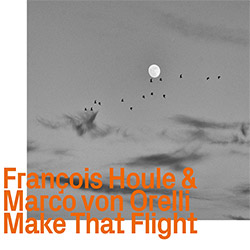
Canadian improvising clarinetist François Houle and Swiss trumpeter Marco von Orelli are heard live at the Bird's Eye Jazz Club, in Basel, Switzerland, 2020 for eleven dialogs reminiscent of the work of John Carter and Bobby Bradford, though uniquely in their own modern language of chamber-oriented jazz through original compositions from both artists.
In Stock
Quantity in Basket: None
Log In to use our Wish List
Shipping Weight: 3.00 units
EU & UK Customers:
Discogs.com can handle your VAT payments
So please order through Discogs
Sample The Album:
Francois Houle-clarinet
Marco von Orelli-cornet
Click an artist name above to see in-stock items for that artist.
UPC: 752156103226
Label: ezz-thetics by Hat Hut Records Ltd
Catalog ID: ezz-thetics 1032
Squidco Product Code: 31982
Format: CD
Condition: New
Released: 2022
Country: Switzerland
Packaging: Cardboard Gatefold
Recorded at the Bird's Eye Jazz Club, in Basel, Switzerland, on September 20th, 2020, by Hannes Kumke.
"Beginning in the second half of the 20th Century, cutting-edge composers strove to integrate improvisation into their work, while the more pioneering exponents of jazz sought to devise new compositional means of expression. The divide between the two endeavors long seemed unbridgeable, except through constructs like instant composition, and improvisation being composition in the moment. The shrinking of what was once a chasm to what can now be likened to a crack in a sidewalk is largely due to an ongoing succession of composer/improvisers like François Houle and Marco von Orelli, who pursue multiple trajectories of experimental music.
A crucial concept in meeting this twain is restructuralism, introduced into the discourse of experimental music by Anthony Braxton nearly 50 years ago to describe the application of fresh, distanced, and potentially transformative perspectives to canonic bodies of work, be it a genre like bebop or the oeuvre of a single composer like Anton Webern. It is an approach predicated on the granular knowledge of the subject and the daring to, in Julius Hemphill's words, go splat.
Houle and von Orelli set a high restructuralist bar by referencing Tandem, John Carter and Bobby Bradford's duet recordings of the late 1970s and early '80s. Overshadowed by their celebrated quartet recordings and Carter's epic Roots and Folklore: Episodes in the Development of American Folk Music, the duets nevertheless documented the LA legends' nuanced and fluid interplay, and the tensile strength of their respective compositions, including staples of their quartet book. It is a bar Houle cleared more than twenty years ago with In the Vernacular: The music of John Carter, a quintet album that included previously unrecorded Carter compositions.
Restructuralism requires foregrounding a sensibility that speaks in the present tense; without it, the resulting music is little more than a name check, a merit badge of connoisseurship. Houle and von Orelli do this in stages, initially circumscribing Carter and Bradford's nimble interplay in the improvised "Tandem," and toasting Flight for Four with Houle's "Make That Flight." They then take another step by placing Carter and Bradford in a larger, diffuse field of associations. The three improvisations referencing Francis Bacon - "For F.," "Mr. B.," and "The Changeable Triptych" - are particularly illustrative, as there are parallels between the painter's often abrasive apposition of the figurative and the abstract, and Carter and Bradford's adding bracing, thickly textured streaks to well-formed phrases with off-handed ease.
In the process, Houle and von Orelli place Carter and Bradford in a decades-long trajectory of horn duets, one that includes earlier recordings like The Lee Konitz Duets and Albert Mangelsdorff and His Friends, and later milestones like Steve Lacy's albums with Steve Potts and Evan Parker. Each addition to such trajectories brings new elements to the table; in Houle and von Orelli's case, it is a palette including colors heard as often in contemporary classical music as in post-Coleman jazz. The ease and fluidity with which they accomplish this goes to a critical point entering into the 21st Century's third decade: What is heard as vernacular has greatly expanded since Houle's tribute to Carter, 1998 being towards the end of a decade marked by bitter ideological debate about what did and did not constitute jazz.
The efficacy of this expanded vernacular is dependent on how glints of disparate sources pop up and mix with other materials in a work. The stealth with which such moments are delivered, the flash of recognition they convey, and their equally quick decay into the overall fabric of the music, is essential. Houle and von Orelli make pungent associations throughout the album, yet their brevity and subtlety provoke questions - was that a nod to Jimmy Giuffre? a wink at Booker Little? William O. "Bill" Smith? Manfred Schoof? - rather than wave a flag.
As vivid as they are, these associations remain near the margins of Houle and von Orelli's music, equally subsumed by the strengths of their compositional lexicons as by their improvisations. Both can be credited as having what can be termed an interstitial sensibility, in that they prefer to create in spaces between established schools of compositional thought. However, Houle and von Orelli do not simply triangulate these disparate constellations; they compound them in a way that be likened to the making of salt, a critical restructuralist methodology.
Even a cursory revisiting of Houle and von Orelli's previous recordings confirms that the stark forum afforded by a horn duo strips their music to its essentials, their shared ability to make unorthodox forms and materials sing and dance being the most salient. Fresh, distanced, and potentially transformative perspectives abound on this album, and not just about the music of John Carter, Bobby Bradford, or any other artist; but, more importantly, the tug and pull between the continuity represented by tradition and eruptive revolutionary impulses. Tomorrow remains the question. François Houle and Marco von Orelli may not have definitive answers, but they put forward intriguing terms for ongoing dialogue."-Bill Shoemaker, January 2021
Artist Biographies
• Show Bio for Francois Houle Francois Houle (born August 17, 1961, Lachine): "I am a Canadian clarinetist who embraces pretty much any music where the clarinet is present, or has a bit of profile or history. Although I am classically trained, I have not followed the traditional career path associated with the kind of classical training I came out of. I studied at McGill University with Emilio Iacurto (the legendary, long-time principal clarinetist of the Montreal Symphony Orchestra) and at Yale University with Keith Wilson (whose contribution to the clarinet world is unparalleled). I've had the privilege of participating in masterclasses with some of the world's finest clarinet players, including David Shifrin, Richard Stoltzman and Alan Hacker. It was Alan Hacker who actually opened the door for me to explore new technical and musical possibilities on the clarinet. Having been part of Fires of London and a close collaborator with composers such as Peter Maxwell-Davies, Alan's insatiable curiosity and deep scholarship inspired me to look for my own personal approach. Following a brief visit to his home in the UK in the late 80's I spent some time in Paris practicing and researching clarinet new music repertoire. At that time I still didn't know what I was going to do with my life, except that I had a deep desire to "make it" in the music scene. It was during this period that I discovered the music of Steve Lacy. Steve Lacy's career actually began as a dixieland clarinetist, eventually shifting to the soprano saxophone, an instrument very few jazz musicians had investigated since the great Sydney Bechet due to its range, smaller embouchure and faulty intonation. Steve dedicated his life to bringing this instrument at the forefront of creative music (legend has it that he turned John Coltrane on to the soprano's expressive qualities). At the time I had one occasion of hearing him play live at the New Morning jazz club, and bought a newly released duo recording called "Paris Blues" (Owl Records, 1987) with the great Gil Evans on piano. Heading back to Canada, that was the only music I could listen to for quite a while, being transfixed by Lacy's and Evan's telepathic playing. It was the first time that I had found a jazz performance that rivalled with the finest chamber music making I was then more familiar with. It was a game changer as far as I was concerned. It opened the door for further exploration and discoveries; Anthony Braxton, John Carter, Jimmy Giuffre, all important figures in the development of creative music on the clarinet. It is interesting and deplorable to note that not once were these names ever mentioned in all my years of university clarinet seminars and lessons. It was only a few years later that he agreed to meet with me for one on one lessons at his Paris apartment. His main advice to me was to stick with the clarinet, and forge ahead with my musical thoughts and ideas, no matter how difficult the road ahead may be. After a stint at the Banff Centre, where I worked on my technique and practiced improvisation (the centre has a great library with an extensive jazz and creative music collection), I relocated to Vancouver in the winter of 1989, where I began playing on the creative music scene and met many musicians who eventually became fantastic collaborators; Claude Ranger, Roger Baird, Tony Wilson, amongst many others. At the time, the New Orchestra Workshop Society was approaching its golden years, with the founding of the legendary Glass Slipper, the "go to" venue for creative music on the West Coast. The Vancouver Jazz Festival was well on its way to establishing itself as one of the most innovative international music happening, not only programming some of the biggest names in the business, such as Miles Davis and Wynton Marsalis, but also the most creative musicians on the planet; Cecil Taylor, Evan Parker, John Zorn, Dave Douglas, Anthony Braxton, William Parker, and a whole sleuth of European 1st generation of improvisors such as Misha Mengelberg, Han Benning, ICP, AMM, and the Italian Instabile Orchestra. It was at the 1992 Jazz Festival that I had my first high profile gig, my first band "Et Cetera" sharing the bill with the Steve Lacy Sextet! As I was making my first steps in the improvised community, I also became involved with the contemporary music scene, collaborating with composers such as John Oliver and Paul Dolden, as well as freelancing with established organizations; Vancouver New Music, Vancouver Pro Musica. In 1992 I became a founding member of the Standing Wave ensemble. My activities in both creative music and new music allowed me to forge a strong profile, eventually expanding to collaborations with international musicians, and getting international touring opportunities. Some long standing collaborations were forged during that fruitful period, with luminaries such as Benoît Delbecq and Joëlle Léandre among others. I have since been constantly involved in the advancement of creative music, pursuing collaborative projects with composers and musicians of all persuasions. My work continues to test the boundaries, looking for new vistas and connections with listeners everywhere." ^ Hide Bio for Francois Houle • Show Bio for Marco von Orelli "Marco von Orelli was born and raised in Basel, Switzerland. He completed his musical studies at the University of Music and Theatre Winterthur Zürich (HMT) and the University of Music Basel, where he majored in trumpet and improvisation. Additional study programmes: Jazz, New Music (Neue Musik) and free improvised music. Furthermore he took study trips to Den Haag (NL) in 1997 and two years later to Vienna (A). Since 1997 Marco von Orelli occupies himself with composition. He has given Solo concerts (e.g. for the 20-year anniversary of the cultural magazine "Programmzeitung", for the "Global Landmarks Illumination Initiative" in Bern or for Basel's celebrations for being a part of Switzerland for 500 years in 2001). Marco von Orelli has enjoyed success on stage with the street scene musical by Kurt Weill under the direction of André Bellmont, Werner Düggelin and Heinz Spoerli, as well as with acts such as the George Gruntz Workshop Big Band or with various orchestras like the basel sinfonietta, the Swiss Improvisers Orchestra, TOMMY MEIER - ROOT DOWN, musique brute or Marco von Orelli 5. He is playing in different styles and has been seen giving concerts at such established events as the Jazzfestival Willisau (CH), Jazz à Mulhouse - météo (F) or music unlimited 22 in Wels (A). In 2002 Marco von Orelli toured with the swiss Circus Monti (Music composed by Ben Jeger) and from January 2003 right to the end of 2004 he acted as live musician for the Theatre Puravida in Basel. Marco von Orelli is also known for his collaborations with artists like Flavia Ghisalberti (Butoh-Dancer), Sheldon Suter, Daniel Ott, Jan Schlegel, Christoph Baumann, Co Streiff, Frances Marie Uitti, Johan van Kreij, Béatrice Götz (miR Company), Peter Schärli, Tommy Meier, Omri Ziegele, Michel Wintsch, Christian Weber, Irène Schweizer, Paul Hubweber, Luìs Lopes, Marc Unternährer, Isa Wiss, Luca Sisera, Travassos, Carles Peris, Alex Huber, Frantz Loriot and many more!" ^ Hide Bio for Marco von Orelli
7/1/2025
Have a better biography or biography source? Please Contact Us so that we can update this biography.
7/1/2025
Have a better biography or biography source? Please Contact Us so that we can update this biography.
Track Listing:
1. Fake News 5:51
2. For F. 1:33
3. Strada Monte Verita 2:51
4. Essay 6:35
5. Tandem 5:08
6. Zipline 3:15
7. Mr. B. 1:28
8. The Changeable Triptych 2:53
9. Soliloquy 1:26
10. Make That Flight 4:15
11. Morning Song 1 8:04
Hat Art
Improvised Music
Jazz
Free Improvisation
European Improvisation, Composition and Experimental Forms
Duo Recordings
Recordings by or featuring Reed & Wind Players
Recordings featuring brass instruments - trumpets, trombones, tubas, other horns
Staff Picks & Recommended Items
New in Improvised Music
Jazz & Improvisation Based on Compositions
Search for other titles on the label:
ezz-thetics by Hat Hut Records Ltd.


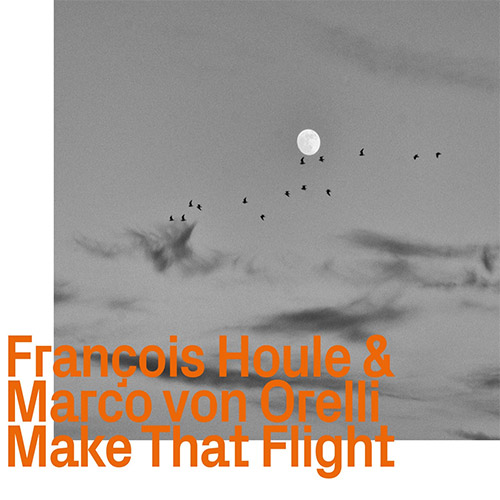



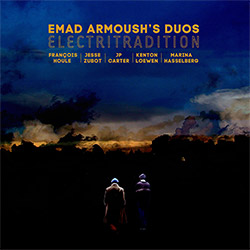
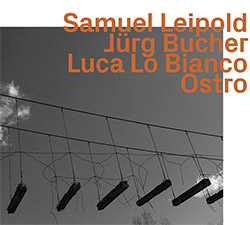
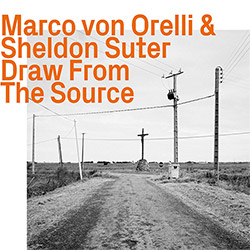
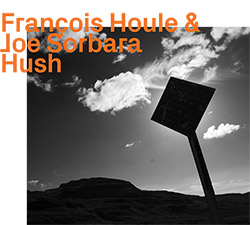

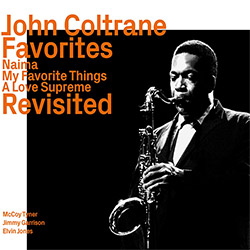

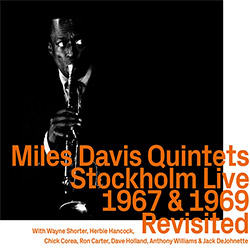

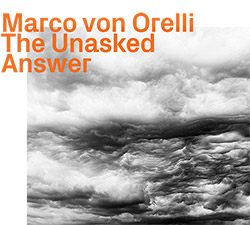
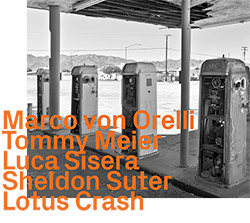


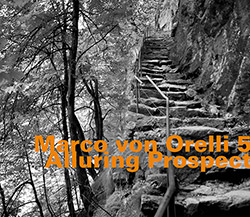

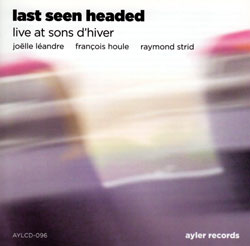

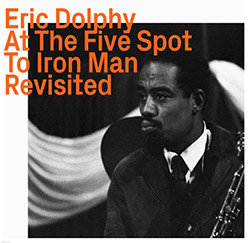
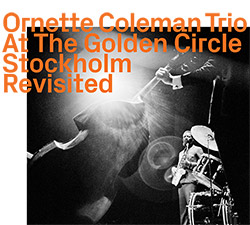

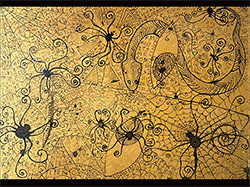
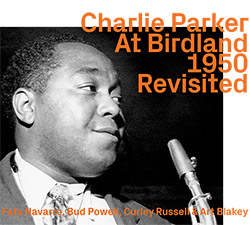











![Deupree, Jerome / Sylvie Courvoisier / Lester St. Louis / Joe Morris: Canyon [2 CDs]](https://www.teuthida.com/productImages/misc4/36404.jpg)


![Eternities: Rides Again [CASSETTE]](https://www.teuthida.com/productImages/misc4/36247.jpg)

![Lopez, Francisco: Untitled (2021-2022) [2 CDs]](https://www.teuthida.com/productImages/misc4/36438.jpg)




![Eventless Plot | Haarvol: The Subliminal Paths [CASSETTE + DOWNLOAD]](https://www.teuthida.com/productImages/misc4/36232.jpg)












![Eventless Plot | Francesco Covarino: Methexis [CASSETTE + DOWNLOAD]](https://www.teuthida.com/productImages/misc4/36231.jpg)



![Das B (Mazen Kerbaj / Mike Majkowski / Magda Mayas / Tony Buck): Love [VINYL]](https://www.teuthida.com/productImages/misc4/36329.jpg)



![Hemphill Stringtet, The: Plays the Music of Julius Hemphill [VINYL]](https://www.teuthida.com/productImages/misc4/36409.jpg)



![Halvorson, Mary Septet: Illusionary Sea [2 LPS]](https://www.teuthida.com/productImages/misc4/17952.jpg)






![Money : Money 2 [2 CDs]](https://www.teuthida.com/productImages/misc4/35894.jpg)




![Klinga, Erik: Elusive Shimmer [VINYL]](https://www.teuthida.com/productImages/misc4/36258.jpg)
![CHANGES TO blind (Phil Zampino): Volume 9 - I Wave on a Fine Vile Mist [CD + DOWNLOAD]](https://www.teuthida.com/productImages/misc4/36061.jpg)

![Wallmart / Rubbish: Asset Protection [split CD]](https://www.teuthida.com/productImages/misc4/35900.jpg)


![+Dog+: The Family Music Book Vol. 5 [2 CDs]](https://www.teuthida.com/productImages/misc4/35897.jpg)
![Kuvveti, Deli : Kuslar Soyledi [CASSETTE w/ DOWNLOAD]](https://www.teuthida.com/productImages/misc4/36107.jpg)

![Nakayama, Tetsuya: Edo Wan [CASSETTE w/ DOWNLOAD]](https://www.teuthida.com/productImages/misc4/36105.jpg)




![Yiyuan, Liang / Li Daiguo: Sonic Talismans [VINYL]](https://www.teuthida.com/productImages/misc4/35957.jpg)
![Brown, Dan / Dan Reynolds: Live At The Grange Hall [unauthorized][CASSETTE]](https://www.teuthida.com/productImages/misc4/36245.jpg)








![Palestine, Charlemagne / Seppe Gebruers: Beyondddddd The Notessssss [VINYL]](https://www.teuthida.com/productImages/misc4/36206.jpg)
![Palestine, Charlemagne / Seppe Gebruers: Beyondddddd The Notessssss [NEON GREEN VINYL]](https://www.teuthida.com/productImages/misc4/36207.jpg)

![Laubrock, Ingrid: Purposing The Air [2 CDs]](https://www.teuthida.com/productImages/misc4/35639.jpg)

![Yoko, Ono / The Great Learning Orchestra: Selected Recordings From Grapefruit [2 CDs]](https://www.teuthida.com/productImages/misc4/35841.jpg)









![Zorn, John / JACK Quartet: The Complete String Quartets [2 CDs]](https://www.teuthida.com/productImages/misc4/35609.jpg)

![Lonsdale, Eden: Dawnings [2 CDs]](https://www.teuthida.com/productImages/misc4/35480.jpg)



![Sorry For Laughing (G. Whitlow / M. Bates / Dave-Id / E. Ka-Spel): Rain Flowers [2 CDS]](https://www.teuthida.com/productImages/misc4/35985.jpg)

![Rolando, Tommaso / Andy Moor : Biscotti [CASSETTE w/ DOWNLOADS]](https://www.teuthida.com/productImages/misc4/36106.jpg)


![Electric Bird Noise / Derek Roddy: 8-10-22 [CD EP]](https://www.teuthida.com/productImages/misc4/35970.jpg)








![Elephant9 : Mythical River [VINYL]](https://www.teuthida.com/productImages/misc4/34624.jpg)



![Elephant9 with Terje Rypdal: Catching Fire [VINYL 2 LPs]](https://www.teuthida.com/productImages/misc4/35355.jpg)
![Deerlady (Obomsawin, Mali / Magdalena Abrego): Greatest Hits [VINYL]](https://www.teuthida.com/productImages/misc4/34876.jpg)







![Surplus 1980: Illusion of Consistency [CD]](https://www.teuthida.com/productImages/misc4/35069.jpg)
![Staiano, Moe: Away Towards the Light [VINYL + DOWNLOAD]](https://www.teuthida.com/productImages/misc4/35037.jpg)
![Coley, Byron: Dating Tips for Touring Bands [VINYL]](https://www.teuthida.com/productImages/misc4/17906.jpg)

![Lost Kisses: My Life is Sad & Funny [DVD]](https://www.teuthida.com/productImages/misc4/lostKissesDVD.jpg)